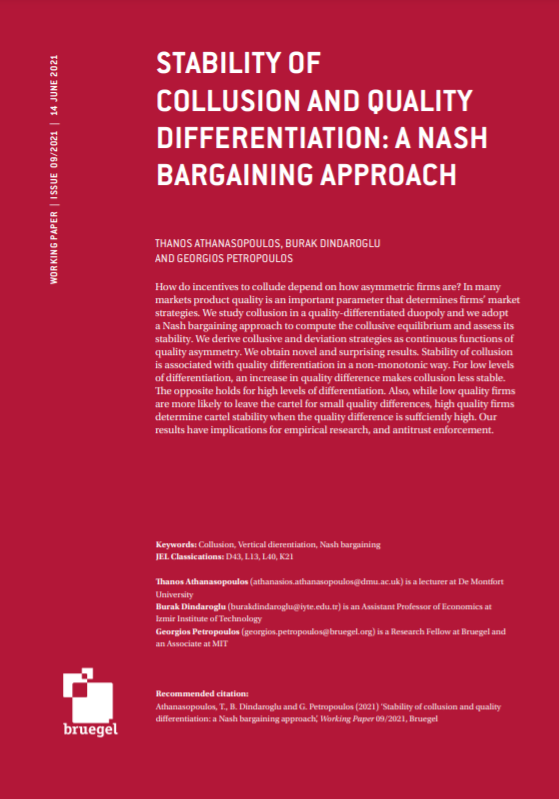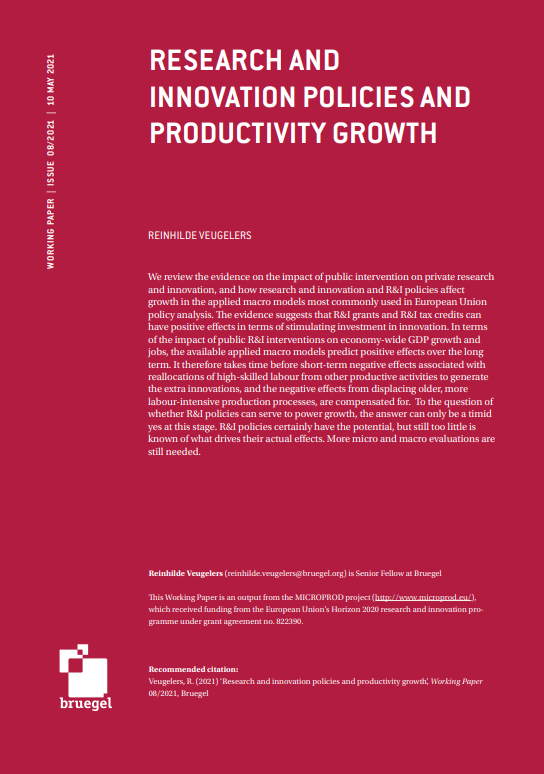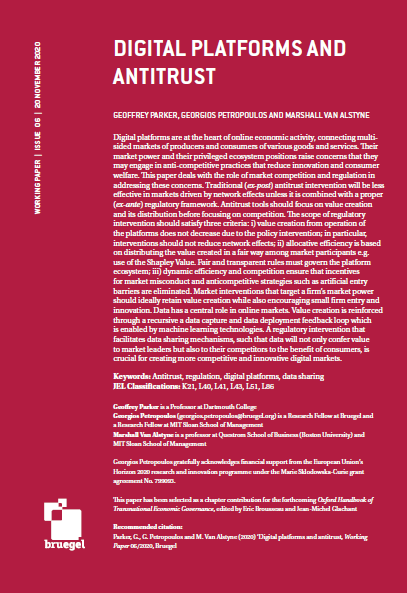Blog Post
The Alstom-Siemens merger and the need for European champions
What’s at stake: The European Commission blocked the merger between Alstom and Siemens, triggering the ire of the French and German governments. A Franco-German proposal to revamp merger control in the EU has given rise to a lively debate on the need for European champions.
Siemens and Alstom, Europe’s largest suppliers in the rail market, were one European Commission decision short of merging into a single ‘European champion’ that would become a global leader in the industry. But on 6 February 2019 the European Commission blocked that move, as the “merger would have harmed competition in markets for railway signalling systems and very high-speed trains”.
This decision attracted attention for two reasons. First, merger prohibitions in Europe are few and far between. As Patrick Rey and Jean Tirole explain, in 2018 “the Commission approved 370 mergers unconditionally, and a further 23 with conditions (or “commitments”) attached” whereas it “blocked only two mergers in 2017, none in 2018, and fewer than 30 since the EU Merger Regulation was adopted in 1990”. Second, the attempted merger had the blessing of the French and German governments and the decision of the European Commission drew their open and heavy criticism.
In the aftermath of the decision, ministers from the two countries tabled a ‘Franco-German Manifesto for a European industrial policy fit for the 21st Century’ that rests on three pillars: pooling resources for “massive” investment in innovation; adopting defensive measures, such as a European foreign investment screening framework and a reciprocity mechanism for public procurement with third countries; and, finally, making changes in the European competition framework. These latter changes include an update of the current merger guidelines “to take greater account of competition at the global level, potential future competition and the time frame when it comes to looking ahead to the development of competition to give the European Commission more flexibility when assessing relevant markets” and the possibility of a right of appeal of the Council, under certain conditions, that could override the decisions of the Commission.
As a result of the Alstom-Siemens case and the Franco-German proposals, a debate has broken out: should EU competition policy be changed to facilitate the formation of ‘European champions’? And is it a necessary condition for European firms to be able to compete globally?
Starting with the proponents of the Alstom-Siemens merger, context is of paramount importance. The merger was to take place on the backdrop of the rise of CRRC, a Chinese behemoth of the sector – and the result of a merger itself – that is buoyed by the rapid growth of a largely closed Chinese market. As Elie Cohen writes, where Alstom and Siemens fight over the production of 35 high-speed trains a year, the CRRC makes 230; where the European high-speed market stagnates, China plans to add another 3,200km to its 25,000km network.
So Cohen summarises the key argument in favour of the merger: the European market is saturated, the real markets are abroad, so competition hurts both companies in terms of global competitiveness. Moreover, a European champion would be better positioned to resist the impending hegemony of CRRC. Or, as Guy Verhofstadt put it, “though Alstom and Siemens have each managed to win contracts in several Western and African countries in recent years, their luck could soon run out” and “barring a stronger response from Europe, China’s emergence as the dominant player in the global rail market is not a matter of ‘if’, but ‘when’”.
In this light, European rules on the definition of the relevant market became especially important in ruling on the Alstom-Siemens merger – hence the Franco-German proposal to overhaul them. As Verhofstadt argues, by following the rules the Commission had to “consider the merger’s potential impact on European and regional markets in deciding whether to approve or reject it.
“But the rail market in which Alstom and Siemens operate is global, which means that assessments of market dominance or ‘impediment[s] to competition’ should also account for rivals based in Japan, South Korea, China, and elsewhere” he adds. So, the argument goes, European merger control rules must become more flexible and forward-looking. More generally, for both Verhofstadt and Cohen, the competition framework needs to take into account broader strategic interests and the long-term implications of geopolitical threats.
Therefore, although he strongly rejects a right of appeal by EU member states that would override the Commission’s decisions, Verhofstadt comes out in favor of revamping the rules to facilitate the emergence of European champions. He maintains that in order to compete globally, European firms need scale and, to that effect, he advocates ‘European champions’ á la Airbus.
Shifting to the opposing view, Patrick Rey and Jean Tirole question the Airbus analogy as it applies to the Alstom-Siemens merger. “Whereas Airbus was a new challenger to Boeing, which had a near-monopoly in the commercial-aviation market at the time, the Alstom-Siemens merger would have reduced the number of players in the European rail industry”, they argue.
Moreover, Martin Sandbu cites Bloomberg reporter Chris Bryant to suggest that the competitive disadvantage of the two companies is exaggerated: CRRC’s revenue is indeed larger than Alstom’s and Siemens’ combined, but almost all of it stems from the Chinese market, while in international markets the two companies are three times larger than CRRC.
More generally, Massimo Motta and Martin Peitz point out that there is nothing in merger control that hinders the formation of European champions, provided there are sufficient efficiency gains (synergies and complementarities) to outweigh anti-competitive effects in the short- (higher price, less choice) and long-term (less investment, innovation and quality). “But in the Siemens/Alstom case, there is no public information that points to such synergies, and the European Commission stated that the parties have not substantiated any such efficiency claims”, they add.
The two economists remark that the creation of European champions would be prevented by merger control only in the case in which there are efficiencies in terms of international competition (more units sold abroad) that are not sufficient to outweigh the harm to the European consumer (higher prices). According to the authors, while such cases warrant attention, they are more theoretical possibilities than actual cases and “based on the findings of the European Commission, Siemens/Alstom could have definitely not been one such case”. Either way, they suggest that a joint venture (or other contract) to coordinate foreign sales and production could achieve such efficiencies without resorting to a merger.
Still, Motta and Peitz agree that economic efficiency should not be the sole guiding principle of competition policy. However, they counter that preventing market dominance that affects the security of supply, or military-or-otherwise strategic considerations, makes a good case for blocking a merger, not allowing one. They also concede that competition rules may not be adequate to prevent unfair practices by non-EU firms. To that effect, they propose “preventive intervention – such as excluding from tenders non-EU firms suspected of engaging in such behaviour – or with having to resort to anti-dumping provisions”, while noting that, in the absence of competition from outside the EU, competition between EU firms becomes even more necessary.
Finally, all authors are weary of giving more say to member states over competition policy. “This revolt against the EU competition regime is Europe’s old temptation of national cartelisation rearing its head at the European level”, writes Martin Sandbu. Rey and Tirole stress that elected politicians “are subject to intense lobbying by large firms and industry organizations, which may be more interested in limiting competition than promoting it”. Motta and Peitz fear that “under the cover of enabling the forming of anti-competitive ‘European champions’, short-term political goals that enjoy quick popular support would guide decision-making”.
So is it possible to reconcile a European industrial policy with competition policy? The glass seems half-full: all pieces reviewed, regardless of their view on Alstom-Siemens, agree on the need to support investment in innovation and favour the screening of foreign investment and the reciprocal access to procurement. Gerogios Petropoulos and Guntram Wolff add that beyond defensive instruments that address state-subsidy concerns “the real question is whether the EU will strengthen its single market, increase R&D spending, regain its leadership of universities and design a true and integrated AI strategy”.
But on the need for European champions and the attitude of competition policy towards it, consensus is elusive as a survey carried among the European IGM Economic Experts Panel confirms.In the survey, a group of European economists were asked whether they agreed or disagreed with the following two statements: ‘The average European is better off if Europe’s competition authorities let firms merge into European champions in their sectors, even it weakens competition’ and ‘If China and other countries use policies that create giant international firms, then the average European is better off if Europe’s competition authorities let firms merge into European champions in their sectors, even it weakens competition’. As the results indicate (Figure 1), although the majority expressed disagreement with both statements, a sizeable share replied they were uncertain.
Republishing and referencing
Bruegel considers itself a public good and takes no institutional standpoint. Anyone is free to republish and/or quote this post without prior consent. Please provide a full reference, clearly stating Bruegel and the relevant author as the source, and include a prominent hyperlink to the original post.










